So you’ve booked a cruise and now you’re wondering about one crucial detail – are gratuities included in the cruise fare? It’s a common question that many curious travelers like yourself have, and rightfully so. After all, understanding the ins and outs of tipping can make a big difference in your overall cruise experience. Whether you’re a first-time cruiser or a seasoned sailor, this article will shed some light on the fascinating world of cruise gratuities and help you navigate the waters of tipping etiquette on board. Stay tuned to learn more!

What are gratuities?
Gratuities, also known as tips, are additional payments given to service providers, such as waitstaff, bartenders, housekeeping, and other crew members, as a show of appreciation for their exceptional service. While gratuities are not mandatory, they are often customary in the service industry, including the cruise industry. These tips are typically given in addition to the cruise fare and are meant to reward and support the hardworking staff onboard.
Definition of gratuities
Gratuities can be defined as voluntary payments made by passengers to express their gratitude and recognition for the quality service they receive during their cruise vacation. These payments are typically given in cash, but many cruise lines also offer the option to include gratuities in the final bill or make them automatically charged to passengers’ onboard accounts.
Importance of gratuities
Gratuities play an essential role in the cruise industry. They not only provide a significant portion of the income for the hardworking crew members but also serve as a way to maintain high service standards onboard. By rewarding exceptional service with gratuities, passengers motivate the crew members to go above and beyond, creating a memorable and enjoyable experience for everyone on board.
Typical gratuity amounts
The amount of gratuity can vary depending on the cruise line and the individual’s discretion. As a general guideline, most cruise lines recommend a gratuity range of $10 to $15 per person, per day. However, some luxury cruise lines may have higher recommended gratuity amounts. It’s important to note that these amounts are merely suggestions, and passengers are free to tip more or less based on their level of satisfaction with the service received.
Understanding cruise fares
When it comes to cruise fares, it’s crucial to have a clear understanding of what is included and what additional charges may apply. This knowledge can help passengers budget accordingly and avoid any unexpected expenses.
What is included in the cruise fare?
Cruise fares typically include accommodation, meals, entertainment, access to onboard facilities, and transportation between different ports of call. These are the basic amenities provided to all passengers during their cruise vacation. The specific inclusions may vary from cruise line to cruise line, but these are the common elements covered in the initial fare.
Additional charges on top of the cruise fare
In addition to the cruise fare, passengers should be prepared for certain additional charges that are not included in the base price. These charges may include alcoholic beverages, specialty dining, spa treatments, Wi-Fi access, gratuities, shore excursions, and miscellaneous onboard purchases. It’s essential to carefully review the cruise line’s policies and pricing to accurately estimate the total cost of the trip.
Gratuities as a separate charge
Gratuities are often not included in the cruise fare and are billed as a separate charge. While some cruise lines allow passengers to prepay gratuities before the cruise, others automatically add them to passengers’ onboard accounts. By separating gratuities from the initial fare, cruise lines provide passengers with the flexibility to decide the appropriate amount to reward the onboard crew based on the quality of service received.
Different cruise lines’ policies
Each cruise line has its own policies and guidelines regarding gratuities. These policies can be categorized into three main types: cruise lines with gratuities included, cruise lines with optional gratuities, and cruise lines with mandatory gratuities.
Cruise lines with gratuities included
Some cruise lines have chosen to include gratuities in the initial fare. This means that the gratuity amount is factored into the overall cruise cost, and passengers do not have to worry about making additional payments to the crew. This approach simplifies the tipping process and ensures that the crew members are adequately compensated without relying on individual gratuities.
Cruise lines with optional gratuities
Other cruise lines allow passengers to decide whether or not to provide gratuities. While there is usually a suggested gratuity amount, passengers have the flexibility to adjust the tip based on their satisfaction with the service. This approach gives passengers more control over their budget and allows them to reward outstanding service while also considering their overall cruise experience.
Cruise lines with mandatory gratuities
Certain cruise lines enforce mandatory gratuities, meaning that a fixed amount per person, per day, is automatically billed to passengers’ onboard accounts. This ensures that all crew members receive a fair share of gratuities regardless of whether or not passengers provide additional tips. While some may argue that mandatory gratuities limit choice, this approach helps guarantee a consistent level of compensation for the hardworking crew members.
Factors influencing gratuity policies
Several factors influence a cruise line’s gratuity policy. These include cruise line culture and traditions, geographical considerations, and local labor laws and regulations.
Cruise line culture and traditions
The gratuity policies of cruise lines often align with their respective cultures and traditions. For example, cruise lines originating from countries where tipping is not customary may have different approaches to gratuities compared to those from countries where tipping is a prevalent practice. Understanding the specific culture and traditions of a cruise line can help passengers navigate the tipping expectations and guidelines more effectively.
Geographical considerations
Cruise lines that operate globally have to take into account the different cultural norms and expectations regarding gratuities in the various regions they visit. Some ports of call may have different customs when it comes to tipping, and cruise lines may adjust their policies accordingly to respect and align with local practices. This ensures that both passengers and crew members are comfortable with the gratuity procedures in different destinations.
Local labor laws and regulations
The labor laws and regulations of the countries where the cruise lines operate also play a role in determining their gratuity policies. Certain jurisdictions might have specific laws regarding the allocation and distribution of gratuities, which cruise lines must adhere to. These regulations ensure fair compensation and protect the rights of the crew members, while also providing a transparent framework for passengers to understand how their gratuities are managed.

Gratuity allocation and distribution
While passengers may provide gratuities as a general pool of funds, the cruise lines are responsible for allocating and distributing these tips in a fair and transparent manner.
Who receives the gratuities?
Gratuities are typically distributed among various members of the onboard staff who directly or indirectly contribute to the passenger experience. This includes waitstaff, cabin stewards, bartenders, housekeeping, and other service providers. The specific breakdown of how gratuities are distributed can vary from cruise line to cruise line. Clear guidelines are in place to ensure that all crew members who contribute to passengers’ comfort and satisfaction receive a fair share of the gratuities.
Fair distribution practices
Cruise lines have established fair distribution practices to allocate gratuities appropriately among the eligible crew members. These practices take into account factors such as working hours, job responsibilities, and passenger feedback. By following fair distribution practices, cruise lines ensure that all crew members, regardless of their role or position, are recognized and rewarded for their contributions to the overall cruise experience.
Role of the cruise line
The cruise line plays a significant role in managing and overseeing the gratuity allocation and distribution process. They are responsible for implementing fair policies, educating passengers about gratuity guidelines, and ensuring that the tips collected are distributed fairly among the crew members. The cruise line’s involvement ensures transparency and accountability in the gratuity system, giving passengers confidence that their tips are being used to support the hardworking staff.
Benefits of gratuities
Gratuities provide numerous benefits to both the passengers and the cruise staff, contributing to a positive and enjoyable cruise experience for all.
Supporting cruise staff
Gratuities serve as an essential source of income for the hardworking crew members. As many crew members rely on gratuities to supplement their wages, these tips directly impact their livelihood. By providing gratuities, passengers contribute to the financial well-being of the crew, enabling them to support their families and achieve a better quality of life.
Maintaining high service standards
Gratuities act as an incentive for the crew members to consistently deliver exceptional service. The promise of monetary rewards encourages the staff to go above and beyond to meet passengers’ needs and expectations. By maintaining high service standards, cruise lines can create a positive reputation and attract more passengers, resulting in a win-win situation for both the crew and the guests.
Recognition for exceptional service
Gratuities also serve as a means of recognizing outstanding service provided by the crew members. Passengers have the opportunity to express their appreciation for those who have gone the extra mile to ensure their comfort and satisfaction. These tips provide tangible recognition for the crew’s hard work and dedication, boosting their morale and motivation to continue delivering exceptional service to future passengers.

Understanding automatic gratuities
Automatic gratuities are increasingly becoming the norm in the cruise industry. It’s essential for passengers to understand what automatic gratuities are and how they function.
Definition of automatic gratuities
Automatic gratuities, also known as service charges or pre-paid gratuities, refer to the gratuity amount that is automatically added to passengers’ onboard accounts or included in the final bill. Instead of passengers individually tipping each crew member, the cruise line collects these automatic gratuities and distributes them among the eligible staff members.
How automatic gratuities work
Automatic gratuities simplify the tipping process for passengers by eliminating the need to carry cash or individually tip each crew member. The specified amount, typically calculated on a per person, per day basis, is automatically applied to passengers’ accounts. This amount can usually be adjusted or removed upon request if passengers are not satisfied with the service or prefer to handle tips personally.
Pros and cons of automatic gratuities
Automatic gratuities offer several advantages. They ensure a consistent distribution of tips among the crew members, regardless of passengers’ individual tipping habits or forgetfulness. Additionally, they provide convenience for passengers, as they do not have to worry about carrying cash for tips throughout the cruise. However, some passengers may prefer to have more control over their gratuities or may want to reward specific crew members directly. In such cases, automatic gratuities may not align with individual preferences.
Managing gratuity charges
Passengers have options when it comes to managing gratuity charges. It’s essential to be familiar with the available choices to ensure a satisfactory tipping experience.
Opting out of automatic gratuities
Passengers who prefer not to participate in the automatic gratuity system can usually opt out by contacting the cruise line in advance or making the request at the guest services desk onboard. It’s important to note that if automatic gratuities are waived, passengers are typically expected to provide individual cash tips directly to the crew members they wish to recognize.
Modifying gratuity amounts
For passengers who are satisfied with the automatic gratuity system but want to adjust the amount, many cruise lines offer the option to modify the daily gratuity rate. This can be done by contacting the guest services desk or adjusting the amount online if available. It’s important to check the specific policy of the cruise line to ensure compliance with their guidelines.
Alternative ways to show appreciation
In addition to gratuities, passengers can show appreciation and support for the crew members in various other ways. This can include writing personal notes of gratitude, recognizing outstanding service through guest feedback forms, or participating in any onboard recognition programs offered by the cruise line. These alternative methods allow passengers to acknowledge exceptional service without relying solely on monetary gratuities.
Tips for handling gratuities on a cruise
To navigate the gratuity process smoothly, consider the following tips:
Researching cruise line policies
Before embarking on a cruise, take the time to thoroughly research the gratuity policies of the chosen cruise line. Understanding the expectations and options available will help avoid any surprises or misunderstandings during the trip.
Budgeting for gratuities
Include gratuities in the overall budget for the cruise. As gratuity charges can add up significantly over the duration of the trip, it’s important to allocate funds accordingly to ensure a stress-free experience.
Communicating with the cruise staff
If there are any questions or concerns regarding gratuities, don’t hesitate to communicate with the guest services staff or the designated onboard tipping coordinator. They can provide clarification and guidance, ensuring a better understanding of the gratuity system and its impact on both passengers and crew members.
Conclusion
Gratuities are an integral part of the cruise experience and play a crucial role in supporting the hardworking staff while maintaining high service standards. By understanding the various gratuity policies, passengers can navigate the tipping process more effectively and show their appreciation for exceptional service. Whether through automatic gratuities or alternative ways of recognition, gratuities ensure that the crew members are rewarded for their efforts, contributing to a memorable and enjoyable cruise vacation for all.



